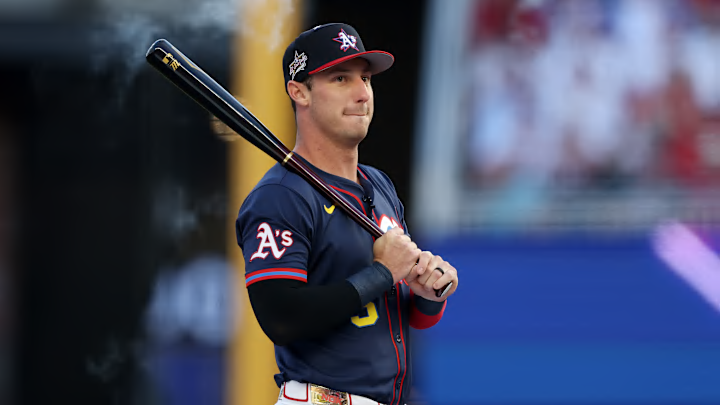The 2025 MLB Home Run Derby lived up to the hype of its powerful list of competitors. Seattle Mariners standout Cal Raleigh became the first catcher and switch-hitter to win the event. However, he may have benefitted from a wrinkle in the rules that left Athletics slugger Brent Rooker with the short end of the stick.
Rooker and Raleigh each finished with 17 homers after the first round of the Derby. They were tied for the fourth and final spot of the ensuing knockout bracket. Nonetheless, the latter ultimately advanced because his deepest long ball traveled less than an inch farther than the former (.08 feet to be exact). There are bad beats in sports, and then there's this.
Yet, that's not even what irked the Athletics standout about the outcome; the lack of transparency about the guidelines was.
Brent Rooker on the HR Derby Tiebreaker with Cal Raleigh https://t.co/bXR4FBkIUl pic.twitter.com/IJXc0E1m2e
— Baseball Isn’t Boring (@BBisntBoring) July 15, 2025
For more news and rumors, check out MLB Insider Robert Murray’s work onThe Baseball Insiders podcast, subscribe to The Moonshot, our weekly MLB newsletter, and join the discord to get the inside scoop during the MLB season.
Brent Rooker calls out MLB for lack of transparency about Home Run Derby rules
"You know, maybe if they have it to the decimal point, they should display that during the Derby and not wait till everyone's done to bring out that information that might be helpful," Rooker stated (h/t Baseball Isn't Boring).
As Rooker alludes to, the league rounded up to the nearest whole digit when showing the distance of each blast. Why they chose to do that despite using Statcast's precise measurements as decisive means of moving onto the next round remains unclear. Regardless, it's difficult to justify, knowing the exact number makes a difference.
Had Rooker known in the moment, perhaps it would've changed his approach at the plate. Maybe he'd have swung for the moon more rather than focusing on just getting the ball over the outfield walls. The margins were razor-thin, which could've forced him to adjust accordingly.
Moreover, that might not even be the worst part about Rooker getting the raw end of the deal. He also noted that there was miscommunication about the 40 pitches afforded to him in Round 1. Consequently, his childhood hitting coach, Joe Caruso, had two fewer balls to work with.
"I think I only had 38 balls in my crate," Rooker voiced. "I think we were shorted two ... they told me before I went up there that I can take two pitches. But we didn't know that there were only 40 balls already in the crate. So I took two pitches that didn't count ... [but] there was only 38 remaining."
Despite everything, Rooker said that he still "had a great time," which is what matters in the end. But the two-time All-Star could've had an even better time by leaving with the $1,000,000 first-place prize (or $500,000 runner-up). With that in mind, revisionist history may look at Raleigh's efforts in Atlanta differently.
